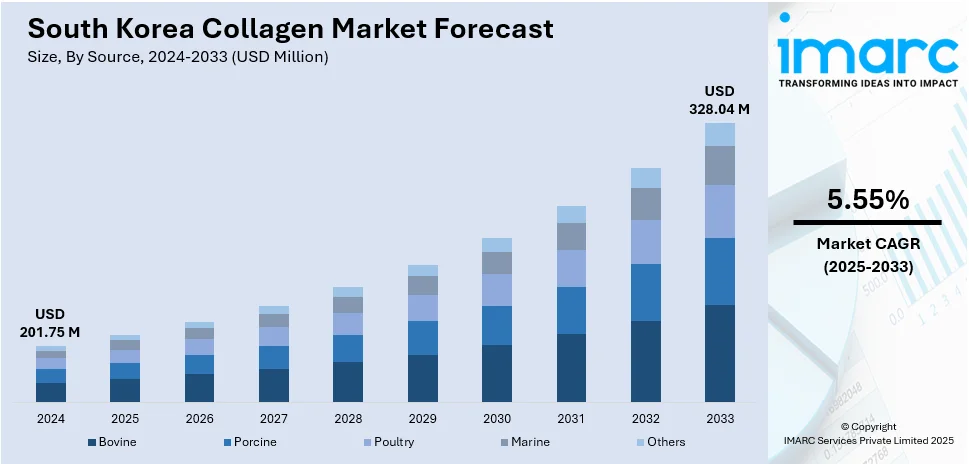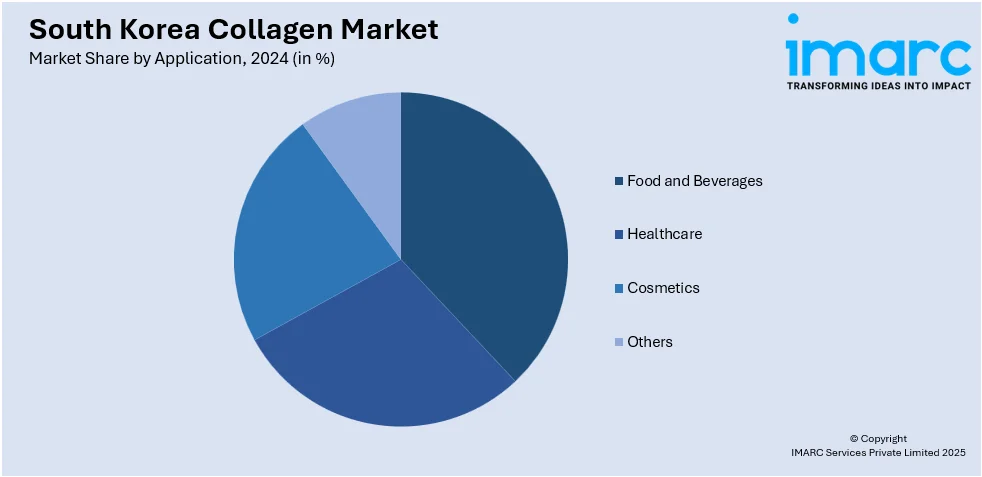
South Korea Collagen Market Size, Share, Trends and Forecast by Source, Product, Application, and Region, 2025-2033
South Korea Collagen Market Overview:
The South Korea collagen market size reached USD 201.75 Million in 2024. The market is projected to reach USD 328.04 Million by 2033, exhibiting a growth rate (CAGR) of 5.55% during 2025-2033. The market is witnessing significant growth led by rising consumer awareness towards health, beauty, and wellness benefits of collagen-based offerings. Growing demand in sectors like cosmetics, pharmaceuticals, and food & beverages is driving innovation and diversification by product types and sources. Sustainable sourcing and enhanced formulation are the areas of focus for market players to address changing consumer expectations. This ever-changing environment is influenced by technological innovation and strategic partnerships, further supporting the South Korea collagen market share.
|
Report Attribute
|
Key Statistics
|
|---|---|
|
Base Year
|
2024
|
|
Forecast Years
|
2025-2033
|
|
Historical Years
|
2019-2024
|
| Market Size in 2024 | USD 201.75 Million |
| Market Forecast in 2033 | USD 328.04 Million |
| Market Growth Rate 2025-2033 | 5.55% |
South Korea Collagen Market Trends:
Emerging Use of Collagen in Daily Functional Foods
On April 10, 2024, the Korean Ministry of Food and Drug Safety announced plans to launch a personalized health functional food system to provide wider access to unit-dose nutritional products based on individual needs. This move is in line with growing consumer demand: collagen is being blended into daily staples such as coffees, snack bars, and ready-to-drink beverages not as supplements, but as part of daily diets. This transition highlights a consumer segment that prioritizes ease, convenience, and efficacy. Manufacturers have responded by focusing on clean-label ingredients that highlight the use of natural ingredients, less processing, and enhanced collagen bioavailability. These products, which may be paired with vitamins, peptides, or antioxidants, are formulated to easily integrate into hectic lifestyles. These products appeal to the health-conscious consumer seeking skin, joint, and bone health without disturbing their regimens. The focus is not just on adding collagen, but on delivering it through functional and appealing formats. The trend is fueling creativity and is one of the reasons the South Korea collagen market growth.

To get more information on this market, Request Sample
Collagen-Infused Beverage Boom Accelerates
On January 1, 2025, South Korea implemented new regulations under its food safety system that tightened labeling and advertising standards for functional foods, including collagen products, requiring human-applicable test evidence for claims on hangover relief and other health benefits. This regulatory update has had a notable impact: beverage makers are responding by launching more collagen-infused drinks ranging from flavored shots and jelly sticks to fortified coffees with transparent health claims. Modern consumers seek products that offer both convenience and scientifically supported benefits. As a result, manufacturers are increasingly working within the regulatory framework to develop beverages that combine collagen with antioxidants, vitamins, and natural botanicals. These drinks are designed for health-conscious consumers seeking beauty and wellness benefits in simple, accessible formats. Clean-label credentials, backed by reinforced safety standards, are becoming essential, and consumer trust is rising alongside innovation. This growth in product credibility is fueling broader South Korea collagen market trends, signaling a shift toward scientifically validated, lifestyle-compatible collagen beverages that resonate with modern health-conscious audiences.
Surge in Beauty Collagen Products
South Korea saw increased consumer interest in collagen-infused beauty products during June 2025. The primary drivers of this demand are women aged 25 to 45 years old, who are most concerned about skin elasticity, moisturizing, and anti-aging qualities. Collagen is highlighted in a range of product lines such as creams, serums, and supplements, which are often combined with ingredients such as peptides, hyaluronic acid, and antioxidants to achieve enhanced overall skin care. Demand stems from consumers who seek clean-label products that have open ingredient panels and scientifically supported benefits. Demand for this is compeling companies to create more effective delivery systems that can increase collagen uptake and effectiveness. Beauty collagen products also now form part of routine regimens, providing long-term skin health rather than just temporary cosmetic gains. Their popularity is also linked to South Korea's overall reputation as a global leader in skincare innovation. With the market expansion, the contribution of collagen to beauty and wellness becomes increasingly significant, in accord with shifting consumer needs and supporting the significance of skin health in personal care.
South Korea Collagen Market Segmentation:
IMARC Group provides an analysis of the key trends in each segment of the market, along with forecasts at the country and regional levels for 2025-2033. Our report has categorized the market based on source, product, and application.
Source Insights:
- Bovine
- Porcine
- Poultry
- Marine
- Others
The report has provided a detailed breakup and analysis of the market based on the source. This includes bovine, porcine, poultry, marine, and others.
Product Insights:
- Gelatin
- Hydrolyzed Collagen
- Native Collagen
- Synthetic Collagen
- Others
A detailed breakup and analysis of the market based on the product have also been provided in the report. This includes gelatin, hydrolyzed collagen, native collagen, synthetic collagen, and others.
Application Insights:

- Food and Beverages
- Functional Food
- Functional Beverages
- Dietary Supplements
- Confectionary
- Desserts
- Meat Processing
- Healthcare
- Bone and Joint Health Supplements
- Wound Dressing
- Tissue Regeneration
- Medical Implants
- Cardiology
- Drug Delivery
- Cosmetics
- Beauty Supplements (Nutricosmetics)
- Topical Cosmetic Products
- Others
The report has provided a detailed breakup and analysis of the market based on the application. This includes food and beverages (functional food, functional beverages, dietary supplements, confectionary, desserts, and meat processing), healthcare (bone and joint health supplements, wound dressing, tissue regeneration, medical implants, cardiology, and drug delivery), cosmetics (beauty supplements (nutricosmetics) and topical cosmetic products), and others.
Regional Insights:
- Seoul Capital Area
- Yeongnam (Southeastern Region)
- Honam (Southwestern Region)
- Hoseo (Central Region)
- Others
The report has also provided a comprehensive analysis of all the major regional markets, which include the Seoul Capital Area, Yeongnam (Southeastern Region), Honam (Southwestern Region), Hoseo (Central Region), and others.
Competitive Landscape:
The market research report has also provided a comprehensive analysis of the competitive landscape. Competitive analysis such as market structure, key player positioning, top winning strategies, competitive dashboard, and company evaluation quadrant has been covered in the report. Also, detailed profiles of all major companies have been provided.
South Korea Collagen Market News:
- February 2025: MAYPHARM Co., Ltd., based in Seoul, has introduced SKINCOLLA, the world’s first recombinant human collagen filler, marking a significant milestone in aesthetic innovation. Combining Demulcent™ Type I recombinant collagen with hyaluronic acid, SKINCOLLA offers a biocompatible and non‑animal-derived solution for skin rejuvenation. It targets wrinkles, sagging, and volume loss, while promoting hydration and elasticity. The filler’s design emphasizes reduced pain, no downtime, and broad cultural acceptance. This launch underscores South Korea’s leadership in cutting‑edge, science-driven cosmetic biotech.
- August 2024: South Korea’s Bloomage showcased its advanced bioactive substances at CPHI and HI Korea exhibitions in Seoul. Highlighting its Bloomcolla Recombinant Human Collagen III, designed for skin regeneration and wound healing, the company emphasized innovation in medical-grade collagen. Bloomage also introduced functional food additives supporting aging and neurodevelopment. With South Korea as its second-largest export market, Bloomage aims to deepen local market insights and continue delivering targeted, science-driven products, reinforcing its leadership in collagen and bioactive solutions.
South Korea Collagen Market Report Coverage:
| Report Features | Details |
|---|---|
| Base Year of the Analysis | 2024 |
| Historical Period | 2019-2024 |
| Forecast Period | 2025-2033 |
| Units | Million USD |
| Scope of the Report |
Exploration of Historical Trends and Market Outlook, Industry Catalysts and Challenges, Segment-Wise Historical and Future Market Assessment:
|
| Sources Covered | Bovine, Porcine, Poultry, Marine, Others |
| Products Covered | Gelatin, Hydrolyzed Collagen, Native Collagen, Synthetic Collagen, Others |
| Applications Covered |
|
| Regions Covered | Seoul Capital Area, Yeongnam (Southeastern Region), Honam (Southwestern Region), Hoseo (Central Region), Others |
| Customization Scope | 10% Free Customization |
| Post-Sale Analyst Support | 10-12 Weeks |
| Delivery Format | PDF and Excel through Email (We can also provide the editable version of the report in PPT/Word format on special request) |
Key Questions Answered in This Report:
- How has the South Korea collagen market performed so far and how will it perform in the coming years?
- What is the breakup of the South Korea collagen market on the basis of source?
- What is the breakup of the South Korea collagen market on the basis of product?
- What is the breakup of the South Korea collagen market on the basis of application?
- What is the breakup of the South Korea collagen market on the basis of region?
- What are the various stages in the value chain of the South Korea collagen market?
- What are the key driving factors and challenges in the South Korea collagen market?
- What is the structure of the South Korea collagen market and who are the key players?
- What is the degree of competition in the South Korea collagen market?
Key Benefits for Stakeholders:
- IMARC’s industry report offers a comprehensive quantitative analysis of various market segments, historical and current market trends, market forecasts, and dynamics of the South Korea collagen market from 2019-2033.
- The research report provides the latest information on the market drivers, challenges, and opportunities in the South Korea collagen market.
- Porter's five forces analysis assist stakeholders in assessing the impact of new entrants, competitive rivalry, supplier power, buyer power, and the threat of substitution. It helps stakeholders to analyze the level of competition within the South Korea collagen industry and its attractiveness.
- Competitive landscape allows stakeholders to understand their competitive environment and provides an insight into the current positions of key players in the market.
Need more help?
- Speak to our experienced analysts for insights on the current market scenarios.
- Include additional segments and countries to customize the report as per your requirement.
- Gain an unparalleled competitive advantage in your domain by understanding how to utilize the report and positively impacting your operations and revenue.
- For further assistance, please connect with our analysts.
 Request Customization
Request Customization
 Speak to an Analyst
Speak to an Analyst
 Request Brochure
Request Brochure
 Inquire Before Buying
Inquire Before Buying




.webp)




.webp)












